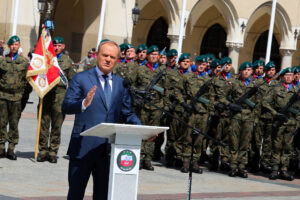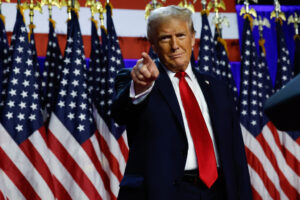Across much of Eastern Europe, being a Trump whisperer has become an overnight job requirement. Aside from Viktor Orbán and a few other examples of genuine giddiness, leaders right across the former Soviet bloc have rushed to show their value to Washington generally and to the blonde businessman in particular. In Lithuania, for instance, Gitanas Nausėda emphasised that his country currently allocates 3.5% of GDP to defence. Politicians from Romania to Estonia have made similarly servile sounds, pleading that they long served as model US allies.
In Warsaw, however, politicians struck a rather less sycophantic tone. “The wind of history is blowing even stronger,” proclaimed Radosław Sikorski, the Polish foreign minister, soon after Trump’s victory. “Poland’s leadership will rise to the occasion.” And why not? Poland already leads Europe on defence spending as a percentage of GDP, and boasts the third-largest army in Nato. And, especially if Trump makes good on his threat to abandon his transatlantic allies to their fate, the country might yet have an opportunity to become a military powerhouse right across the continent — one that could yet evoke the country’s bygone days of geopolitical dominance.
Trump’s election is already transforming Polish politics. With the country’s 2025 presidential election looming, Sikorski, who threw his hat into the ring to become the nominee for the ruling Civic Platform party shortly before the US election, has now recalibrated his campaign around Trump’s victory. Among other things, Sikorski argues that what Poland needs now is someone with the diplomatic experience to weather the vagaries of a Trump presidency. Just as important, the foreign minister points out that he has a good working relationship with Trump, distinguishing himself from Rafał Trzaskowski, the mayor of Warsaw and Sikorski’s rival for the job.
In reality, though, Trump’s victory is about far more than day-to-day political bickering. For while capitals across Eastern Europe are unsurprisingly worried by the security implications of America First, they equally know that whatever happens, they’re going to have to take care of themselves. And if that means filling a US-shaped void in terms of national security, not least when it comes to Russia, the disappearance of American power may also bolster the presence of the Poles or Romanians on the wider Europe stage.
That’s clear enough West of the Oder. The recent collapse of Olaf Scholz’s government in Germany was partly triggered by arguments over support for Ukraine and the prospect that US assistance might end, even as the chancellor has been criticised by other Nato members for speaking to Vladimir Putin for the first time in years. Not that the chaos in Berlin should surprise the generals in Tallinn or Sofia. Since the start of the war in Ukraine, Nato’s centre of gravity has gradually shifted eastwards. It’s no coincidence that ministerial talks on the future of European defence were lately held in Warsaw. And though Emmanuel Macron has lately started making bold statements about deploying Nato forces to Ukraine, he was only following Poland’s lead.
To put it differently, then, only the Eastern Europeans have concrete incentives to take Trump’s security threats seriously: and only Poland has the wealth and expertise to actually drag its neighbours towards an independent defence policy. And, in a sense, that’s wholly appropriate. For while Western observers are more familiar with Poland’s years of subjugation — first by Prussia and the Tsar, later by Hitler and the Soviets — there was once a time that the country dominated the continent. In 1683, it was chiefly through the intervention of King Jan III Sobieski that Catholic armies defeated the invading Ottomans at the Battle of Vienna. Pope Innocent XI swiftly proclaimed Sobieski the “saviour of Western civilisation” for the timely arrival of the famed winged hussars. Around the same time, Polish kings, ruling over the Polish-Lithuanian Commonwealth, flanked the Baltic and Black Seas, and dominated Central and Eastern European affairs all while maintaining an inventive (if imperfect) system of elective monarchy.
Over subsequent centuries, Polish leaders like Marshal Józef Piłsudski have occasionally tried to reclaim this illustrious mantle, seeing Poland not as a European hegemon, but rather as a power counterweight to both Russian and German expansionism. It goes without saying, of course, that the sober liberals of the Civic Platform don’t see themselves as Sobieskis reborn. Yet with Trump taking a hammer to the foundations of the European security order, the pendulum of history does seem to be swinging back towards a Polish military renaissance.
It surely helps that since the end of the Cold War, Poland has worked hard to build up its forces. Quite aside from the headline GDP numbers, that’s clear enough elsewhere too. The country has emerged as the largest tank power in Europe, and boasts the third-largest fleet of F-16 jets on the continent. That’s shadowed by a recent shipment of F-35s from the US, with Poland receiving a custom model of the plane from Lockheed Martin. The new batch, for its part, is aptly named “Husarz” — a nod to the winged hussars of old. At the same time, Poland’s military leadership recently announced plans to develop an AI centre to support decision-making. Not to be outdone, Warsaw also said it was acquiring 486 HIMARS launchers: a ridiculous number, if undoubtedly a statement of intent.
No less important, Poland has geographical reasons to take defence seriously. The only Nato member to share borders with both Ukraine and Russia, Poles have learnt by hard experience that their location on the North European Plain is painfully exposed. Since Trump’s election, though, officials in Warsaw have eagerly underlined that, whatever the political priorities in Washington, they remain unconcerned about America’s commitment to Poland in particular or Nato in general.
We shouldn’t imagine that Poland can become entirely self-sufficient here, at least not for the moment anyway. It surely speaks volumes that Poland’s president recently felt the need to remind the world, and presumably Trump himself, of the importance of the American alliance. The fact he did so on Poland’s independence day is even more revealing.
But nor should Andrzej Duda worry too much: despite his tough talk, Trump will find it almost impossible to escape Europe entirely. With the landmark opening of the first permanent US base in Poland last week, as part of a broader pan-European missile defence shield, America will necessarily continue to play some role in the region. Ever the businessman, Trump is also likely to see Eastern Europe as an enticing customer for America’s military-industrial complex. Earlier this year, the US granted loans to Poland and Romania, totalling $2 billion and $920 million respectively, all to buy American weapons. Except similar deals over the years ahead — especially if Trump is confident Nebraska farm boys won’t need to be deployed to help use them.
Indeed, the President-elect’s essential self-interest could yet prove a boon to Eastern Europe. That’s doubtless true if Trump reduces the American troop presence enough to satisfy his domestic base — but nonetheless retains the country’s existing military infrastructure. That, in turn, could offer countries like Poland the best of both worlds: the Americans would provide essential support, in line with their own interests, even as Warsaw develops a more independent defence policy, one that ultimately goes beyond the strictures imposed by Washington.
In practice, this means Warsaw could finally execute major defence initiatives previously held in check by the Biden administration. One good example here is shooting down incoming Russian missiles and drones over Ukrainian airspace. As I wrote back in September, Russian projectiles have crossed into Polish, Romanian, and Latvian airspace several times since 2022, occasionally landing hundreds of kilometres inside Nato territory. Not only does this pose a threat to civilians, it also raises the risk of an Article V declaration against Russia. Certainly Mark Rutte, Nato’s new secretary general, seems to understand that where Poland goes, he’ll eventually need to travel too.
Nor is a decline in American interest merely a chance for Warsaw to flex its military muscles. On the contrary, Poland has also shown striking independence on migration policy as well. Warsaw has long viewed the influx of migrants along its border with Belarus — arguably history’s first man-made migration crisis — as indistinguishable from the security threats it faces from Russian hybrid operations in its territory and the errant Russian missiles lobbed from Ukraine. Much to the chagrin of NGOs, and despite some initial pushback, Europe has now mostly accepted the Polish narrative.
Combined with Eastern Europe’s rising military might, and the region is clearly moving away from its traditional role as a pale imitator of Paris or Berlin. On the contrary, Warsaw and Bucharest could yet become the cities where the continent’s policy is devised and executed. Once that Pandora’s Box is opened, moreover, it’ll be impossible to close — even after 2028. Whatever happens in four years, whoever enters the White House after Trump may yet find a Europe transformed, one where the future is decided less in stagnant Brussels, and more in a fearless and prosperous Warsaw.
Disclaimer
Some of the posts we share are controversial and we do not necessarily agree with them in the whole extend. Sometimes we agree with the content or part of it but we do not agree with the narration or language. Nevertheless we find them somehow interesting, valuable and/or informative or we share them, because we strongly believe in freedom of speech, free press and journalism. We strongly encourage you to have a critical approach to all the content, do your own research and analysis to build your own opinion.
We would be glad to have your feedback.
Source: UnHerd Read the original article here: https://unherd.com/



